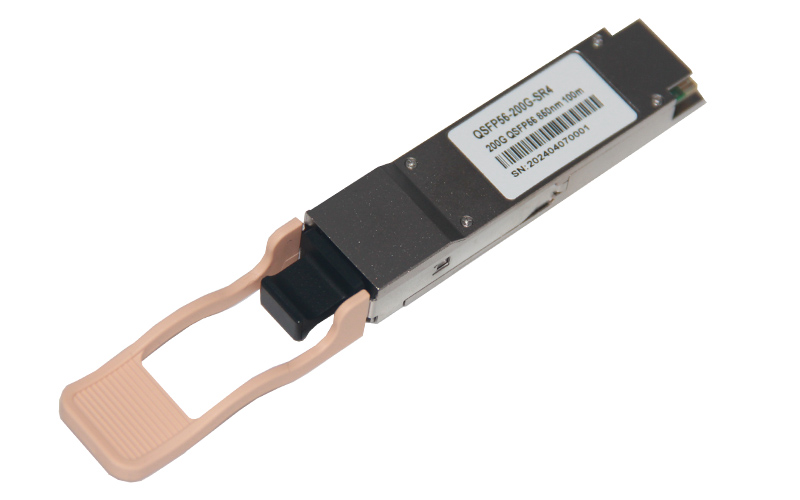

✅ Higher bandwidth density (2x 100G in the same QSFP form factor).
✅ Lower latency for high-performance applications.
✅ Energy-efficient compared to 2x 100G solutions.
✅ Future-proof for next-gen data center upgrades.
Considerations:
⚠ Requires MPO-12 fiber cabling (not compatible with duplex LC).
⚠ OM4/OM5 fiber recommended for optimal performance.
⚠ Ensure switch/NIC compatibility (must support QSFP56 and 200G PAM4).
Typical Use Cases:
✔ Upgrading from 40G/100G to 200G in data centers.
✔ High-bandwidth spine-leaf architectures.
✔ AI/ML and storage area networks (SANs).
Vendors & Availability:
✔ Cisco, Arista, Juniper, H3C, Intel, Broadcom, Innolight, Finisar, etc.
✔ Available from major optical component suppliers.
Data Rate:
✔ Supports 200 Gbps (4x 50 Gbps lanes via PAM4 modulation).
✔ Backward compatible with 50G-SR (50 Gbps per lane) for flexibility.
Form Factor:
✔ QSFP56 (Quad Small Form-Factor Pluggable 56) – Same physical size as QSFP+ and QSFP28 but supports higher data rates.
Optical Interface:
✔ SR4 (Short Range 4-lane) – Uses 4 parallel multimode fiber (MMF) lanes (OM3/OM4/OM5).
✔ MPO-12/APC connector for transmit and receive.
Transmission Distance:
✔ OM3 MMF: Up to 70 meters.
✔ OM4 MMF: Up to 100 meters.
✔ OM5 MMF (Wideband Multimode Fiber): May support longer distances (up to 150 meters, depending on vendor specs).
Wavelength:
✔ Typically operates at 850 nm per lane (4x 850 nm).
Power Consumption:
✔ Typically < 5W, making it energy-efficient for high-speed deployments.
Compliance & Standards:
✔ Compliant with IEEE 802.3cd (200G Ethernet) and QSFP56 MSA standards.
✔ Supports DDM/DOM (Digital Diagnostic Monitoring) for real-time performance tracking.
✔ Data center interconnects (leaf-spine architectures).
✔ High-performance computing (HPC) and AI/ML clusters.
✔ Enterprise networks requiring high bandwidth.
✔ Compatible with 200G switches and NICs (e.g., Cisco Nexus, Arista, Juniper, Mellanox).

© 2024-2026 ARTIC FIBER OPTIC CO.,LTD. All Rights Reserved.